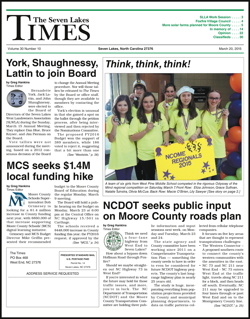 Newly-elected Seven Lakes Land-owners Association [SLLA] Director Steve Hudson plans to resign from the Board, he told The Times on Tuesday.
Newly-elected Seven Lakes Land-owners Association [SLLA] Director Steve Hudson plans to resign from the Board, he told The Times on Tuesday.
In a Letter to the Editor printed in this edition [see page 22], Hudson explains his concern that the current Board of Directors is operating in violation of the SLLA bylaws by voting on matters during what the bylaws describe as a “non-voting” Work Session.
Saying that the definition of “non-voting” is something even a fourth-grader can understand, Hudson writes:”The Board wants you to obey the bylaws and the rules and regulations, but those don’t apply to them.” He then declares his intention to resign.
The issue surfaced during the Monday, April 8 SLLA Work Session — the first held since Board elections in March and the first Hudson had attended since his last term on the Board ended in 2008.
Two meetings with two purposes
Most matters that come before the SLLA Board come to it initially in a Work Session. Often, items on the Work Session agenda have been vetted through committees. Other items are proposed by management or by individual Directors.
During the Work Session, as each item comes up on the agenda, public input is received, and the Directors discuss the matter. The Board then decides whether or not it is ready move the matter to the Open Meeting for a vote.
The practice of having both Work Sessions and Open Meetings may be as old as the Association itself. For many years, the Board conducted its business meeting in a closed Work Session and used the monthly Open Meeting to report its actions to the membership. Votes were rarely, if ever, taken in the Open Meeting. The Board eventually opened its Work Sessions to the public, but continued to make most decisions in those sessions.
A 2007 revision of the SLLA bylaws formally established monthly “non-voting Board work sessions” and confined votes of the Board to the “Regular Director Open Business Meetings” scheduled for the last Wednesday of each month.
After that change, Work Sessions were used to mull over and shape up matters prior to bringing them to the floor of the Open Meeting for a vote. Over the past two years, the decision to move items onto the Work Session agenda has become more formalized, with Directors actually making a motion to “move an item to the Open Meeting,” and then voting on whether to do so.
Hudson objects to Work Session votes
It was these votes to move items to the Open Meeting that concerned Hudson, and from which he abstained throughout the April 8 Work Session. He objected that those votes violated the bylaws and were thus illegal.
Director Bill Hirsch attempted to explain the procedure. “The purpose of the work session is to figure what goes on to the meeting,” said Hirsch. “Why are we sitting here, if we can’t push this on to the meeting?”
“The Robert’s Rules of Order are to get it going, not to nitpick every single thing,” Director Bob Racine said. “We have Robert’s Rules to keep us on track. We have this procedure that we have used in the past where we bring it to open meeting. Let’s just go with. We have to have someway to move it forward.”
President Steve Ritter then asked Hudson how many years had it been since he had been on the Board.
“I am talking about bylaws,” Hudson said. “Our bylaws did not address any of this.” Referring to the Board’s process prior to the 2007 bylaws change, Hudson said, “We voted in the Work Session. And we voted in the Open Meeting. It was legal eight or nine years ago.”
“We are not voting here to approve or disapprove any of these items,” explained Hirsch. “We are voting to move this out of this session, and to do our business of placing things on our agenda.”
Ritter agreed with Hirsch that the Work Session is to decide whether or not an item is ready to move to the Open Meeting for a vote.
“These agenda items are developed by our staff,” Ritter said. “We discuss it as a Board and decide if it is ready to move forward to the main meeting.”
Hudson’s objections surfaced in a discussion regarding a proposed Code of Ethics for the Board. Racine used the Code as an example of how matters move from the Work Session to the Open Meeting.
“This was on the agenda last month,” he said. “And we didn’t move it on.”
Hudson abstained as the Board voted to move that item onto the Open Meeting agenda, and continued to abstain on every other similar vote during the Work Session.
His resignation will leave the Board one member short of its full complement of seven Directors.
Times Editor Greg Hankins contributed reporting to this story.
